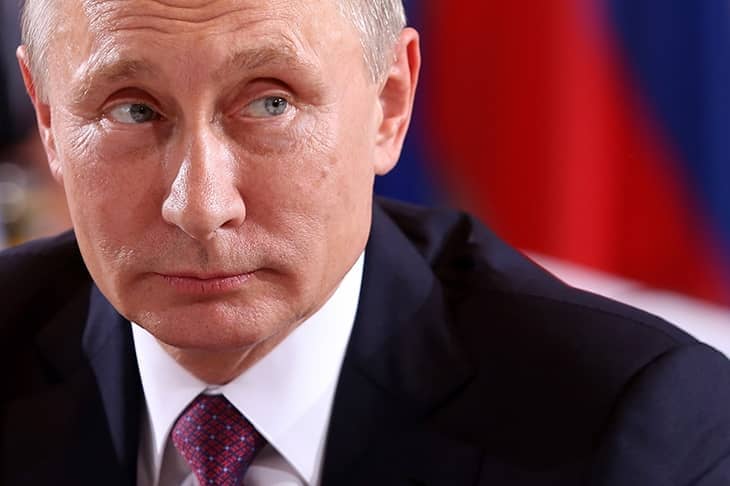According to the new Chief of the Defence Staff, Admiral Sir Tony Radakin, the Russians wish to ‘put at risk and potentially exploit the world’s real information system, which is undersea cables that go all around the world’. Apparently, these carry 99 per cent of international communications. The cables which serve Britain are in the Atlantic, where Russian submarines are increasingly probing. This revelation resembles the plot of a book I loved as a child, The Pirates in the Deep Green Sea, by Eric Linklater, published in 1959. Timothy and Hew are two boys living, temporarily without their parents, on Popinsay, a Scottish island. Through the good offices of Gunner Boles, a 172-year-old sailor who manages mysteriously to live beneath the waves, they discover that the parallels of longitude and latitude are not just marks on a globe but ‘great big strong cables lying at the bottom of the sea’. These ‘hold the world together and keep everything in place’. The points where the ropes cross are secured by knots, and these knots are defended by Boles, an octopus called Scully, and a host of underwater, undead Jolly Jack Tars and good pirates, clad in the vests of former Royal Navy ships. The top good pirate is Davy Jones who lives, of course, in his Locker and served under Drake but, anachronistically, is also an Etonian who parades his men on the Fourth of June. Timothy and Hew enlist with him. The enemy are two power-hungry bad pirates called Dan Scumbril and Inky Poops (‘scoundrels and nincompoops’). Scumbril is stupid, moustachioed and angry; Poops is clever and calculating, with a cruel face ‘the colour of cheese’. They and their repulsive red-vested crew design to capture the knots and replace them with different ones. The key battle ground is Knot 59 N, 4 W, near Popinsay, which would win Scrumbril and Poops control of the Atlantic, much as Admiral Radakin warns. I shall not reveal the denouement. Suffice it to say that the battle ends with the sailors singing ‘in stentorian voices of Nelson and Drake and prize-money and rum’.
After delivering the Margaret Thatcher Day lecture for the Falkland Islands government this week, to mark the coming 40th anniversary of the famous war, I was kindly given a vote of thanks by the Defence Secretary, Ben Wallace. He issued a severe warning to Russia about its belligerence. Given the size of our navy today, he will need to call a great many British maritime spirits from the vasty deep to support his challenge. Perhaps we should improve our morale by referring to Vladimir Putin at all times as Inky Poops.
The advice we journalists offer unsolicited to public figures is often 100 per cent useless. This is particularly true of advice offered to members of the royal family. I haven’t read a single article about the Duke of York which does not condemn him for hiding from Virginia Giuffre’s accusations of sexual misconduct. Even the brilliant Sam Leith, in this paper’s Coffee House, asks: ‘Wouldn’t the Duke be prudent to adopt a legal strategy which made it look less like he was desperately wriggling to avoid giving evidence under oath?’ Surely the answer is blindingly obvious to anyone professionally considering the Duke’s best interests. It must be ‘No’. It would be nice not to appear to be wriggling, of course, but wriggle he must. This is not necessarily because he is hiding the truth — we do not know whether he is or not. It is because the legal system which is trying to ensnare him is American and he is a British prince. Given the media showboating of the American system, its fantastic complication and its scarcely concealed excitement at the thought of getting royalty to appear in a US court, the Duke could only be brought down by it. We know from his notorious Newsnight interview that, even on the grandest of home ground — Buckingham Palace — he is no good at public explanation. How could he survive gruelling courtroom cross-examination in a wholly hostile environment, dragged out through the year of his mother’s Platinum Jubilee? Even the process of deposition, given in Britain, in which he may decide to engage, could endanger him because US lawyers specialise in representing mistakes in depositions as perjury, thus shifting the case from civil to criminal. If you know that your opponents are trying to lure you into an unwinnable situation, you must do everything possible to avoid it. The more ‘technicalities’ in which you can take refuge, the better.
Lord Leigh of Hurley was recently irritated by being told in civil service emails which pronouns he must use when writing to the sender. So he has decided to state how he must be addressed in similar communications — ‘M’lud/Your Lordship’. These are not, of course, pronouns, but they are forms of address, and should be respected in the interests of diversity.
Ovo, an energy supplier, has got into trouble for its advice to customers who can no longer afford its rocketing prices. It recommends them to keep warm with jumpers, ‘non-alcoholic drinks’ and ‘hearty bowls of porridge’, and suggests they should ‘cuddle up with your pets’. Darren Jones, chairman of the Commons Business and Energy Committee, says this is ‘plainly offensive’, but what else can such companies say? It is not in their power to affect the stupefying price rises, so they feel the need to sound helpful. Such noises always accompany situations where energy policy has been grossly mismanaged. In 1974, during the oil price crisis, Edward Heath ordered a three-day week and compounded the problem by inventing a Department of Energy. Poor Patrick Jenkin, its first secretary of state, advised people to ‘clean your teeth in the dark’.
A new entry for my collection of words or phrases guaranteed to strike gloom into the hearer (e.g. ‘replacement bus service, ‘carvery’, ‘HS2’) is ‘mixtape’, now constantly on offer from Radio 3.







Comments